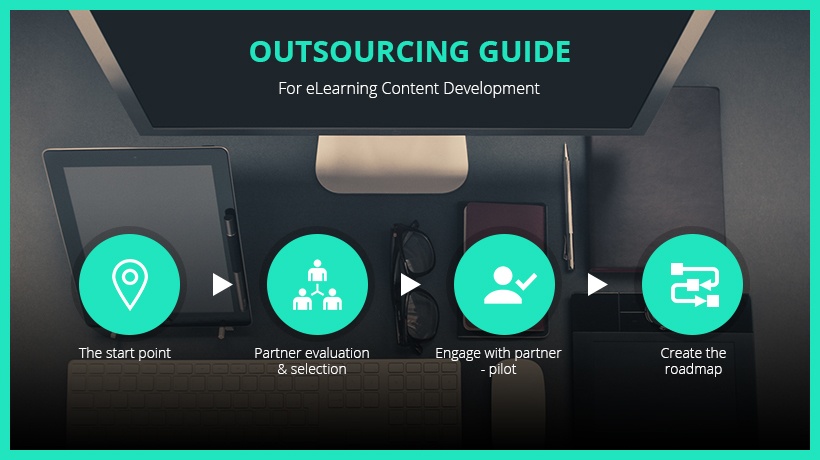8 Key Players You Should Consider In eLearning Outsourcing
You're looking for a new eLearning outsourcing company to handle your next eLearning outsourcing project, and there are a variety of factors to consider. One of the most important is team dynamics. The ideal eLearning outsourcing company must have the right collaborators on-hand in order to create effective eLearning courses. So, who are the key players that you should consider when outsourcing eLearning? In this article, we'll explore the individual roles involved in the process.
1. eLearning Project Manager
This is the team leader who delegates tasks and ensures that everyone is on track. They also serve as the intermediary between you and the eLearning team. For instance, they can convey your feedback to the graphic designer in order to incorporate more branding elements. The eLearning Project Manager should handle every aspect of the eLearning project from start to finish, and provide you with progress reports along the way. In addition, they make certain that everyone has the online tools and resources they require to fulfill their roles. For example, the Subject Matter Expert must have the research documentation they need to develop the key takeaways.
2. Instructional Designer
Instructional Designers identify the best approach that will help online learners absorb, assimilate, and remember the information. This involves choosing the ideal Instructional Design theory or model, as well as researching online learners' needs and preferences. The Instructional Designer usually has a hand in every aspect of the eLearning project, from curating the eLearning content to choosing the right graphics that support the core learning objectives. They also ensure that the subject matter is easily digestible and accessible.
3. Subject Matter Expert
The Subject Matter Expert offers their unique expertise in order to fine tune the learning objectives and target the takeaways. They work with every member of the eLearning team to ensure that online learners get the information they need to achieve their goals. Subject Matter Experts also help to curate content and, in some cases, create the eLearning material. For example, they may use on-the-job observations and employee feedback surveys to develop a task online tutorial. In the case of rapid eLearning projects, Subject Matter Experts play a more prominent role. This is due to the fact that they typically curate, organize, and create the eLearning content themselves, and then use a rapid eLearning authoring tool to develop the eLearning deliverables.
4. eLearning Content Developer
The eLearning content developer is the individual in charge of the written and visual components of the eLearning course. They may have to create the text from scratch or repurpose existing eLearning content. Their job duties can also include sourcing images, graphs, and other aesthetic elements that support the subject matter. For example, finding photos that relate to the compliance topic and tie it into real-world applications. The eLearning content developer usually works closely with the Subject Matter Expert to ensure that the key takeaways are included.
5. Graphic Designer
The graphic designer takes care of the visual elements of the eLearning course that must be created from the ground up. For example, interactive scenarios and simulations. They are also responsible for animations, user interfaces, and responsive design. Their main task is to take all of the information and make it more aesthetically pleasing and easily digestible. As such, they must have a keen awareness of online learners' needs, expectations, and preferences. For example, a high percentage of your audience needs to be able to access the eLearning course on their mobile device. Thus, the graphic designer must incorporate eLearning navigation elements that are multiplatform-friendly, such as drop-down navigation menus and optimized images.
6. LMS Expert
No outsourcing eLearning team would be complete without a resident tech guru. This is the person who handles all of the glitches and ensures that the Learning Management System is running smoothly. They also help you mesh your LMS with third-party eLearning authoring tools. In some cases, the tech expert may even be available to provide further technical support to online learners. For example, online learners can contact them directly if they have an issue accessing the Learning Management System, or they encounter an issue that prevents them from navigating to the next eLearning activity.
7. eLearning Authoring Tool Specialist
The LMS expert and eLearning authoring tool specialist work together to get the software up and running. This individual also collaborates with other members of your eLearning team to familiarize them with the system's features. In some cases, they will work with the members of your organization, as well. For example, the eLearning authoring tool specialist may schedule an orientation meeting with your tech department to show them the ins and outs of the system. Your IT team can then deal with any issues that crop up after the eLearning course is deployed. Not to mention, your organization can add on to or modify the eLearning course when the need arises.
8. Quality Assurance Tester
The Quality Assurance tester must evaluate every aspect of the eLearning course to identify areas for improvement. They typically conduct numerous testing rounds and provide the respective members of the group with feedback. For example, they might reach out to the Subject Matter Expert if additional references or supporting documentation is needed to back up a statistic, or the graphic designer to incorporate relevant charts and graphs in order to clarify a concept. The role of the Quality Assurance tester if of utmost importance, especially if the eLearning project requires extensive testing before and after launch.
These are the 8 major players in eLearning outsourcing. Don't hesitate to ask your eLearning outsourcing company about the eLearning team they have in place, and which tools they use. Also, it's always wise to meet with them in advance to see if they'll mesh with your eLearning team. This helps to ensure that you get the best eLearning ROI, and avoid costly complications in the near future.
eLearning outsourcing doesn't have to be a headache. Read the article 10 Tips To Take The Stress Out Of eLearning Outsourcing to learn how you can take the stress out of the process and achieve the desired results.








